新人教版 九年级英语上册 精品教案 全册合集
新人教版九年级上册初中英语全册优质公开课教案(教学设计)
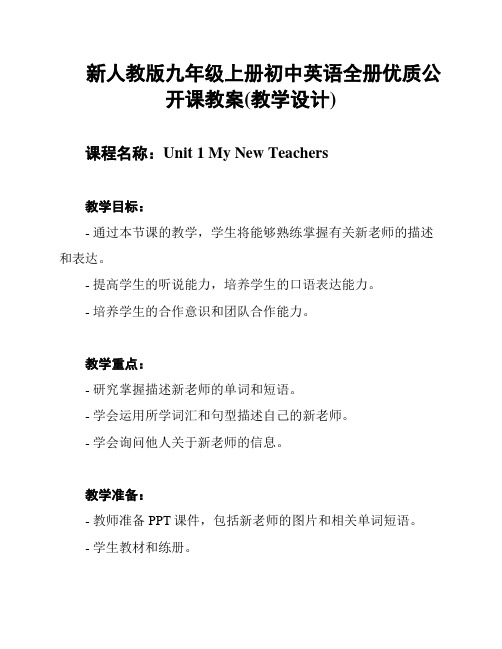
新人教版九年级上册初中英语全册优质公开课教案(教学设计)课程名称:Unit 1 My New Teachers教学目标:- 通过本节课的教学,学生将能够熟练掌握有关新老师的描述和表达。
- 提高学生的听说能力,培养学生的口语表达能力。
- 培养学生的合作意识和团队合作能力。
教学重点:- 研究掌握描述新老师的单词和短语。
- 学会运用所学词汇和句型描述自己的新老师。
- 学会询问他人关于新老师的信息。
教学准备:- 教师准备PPT课件,包括新老师的图片和相关单词短语。
- 学生教材和练册。
教学过程:1. 预导入:- 让学生在教材中找到与新老师相关的对话和信息,引发学生对新老师的讨论。
2. 新课呈现:- 通过PPT呈现新老师的图片,引导学生观察,激发学生对新老师的兴趣。
- 教师朗读并板书相关单词和短语,如:funny, strict, kind, teach, subject, etc.- 帮助学生理解这些词汇的含义和用法。
3. 听力训练:- 播放教材中与新老师有关的录音,要求学生仔细听,并回答问题。
- 教师带领学生讨论录音内容,检查学生对听力材料的理解。
4. 口语表达:- 学生们分组进行合作活动,每组选择一位组员描述自己的新老师,其他组员根据描述的特点猜测是哪位老师。
- 教师在每组间转动,观察学生的口语表达和合作情况,提供必要的指导和帮助。
5. 互动交流:- 分角色进行对话练,有几个学生扮演新老师的角色,其他学生通过提问的方式了解新老师的信息。
- 教师引导学生运用学到的句型和表达方式进行对话,确保每个学生都有参与。
6. 总结反思:- 教师和学生一起总结本节课所学到的词汇、短语和句型。
- 学生们分享本次合作活动的感受和收获。
课后作业:- 完成练册上与新老师相关的练题。
- 列表格,描述自己的新老师,并写出自己对他(她)的评价。
教学延伸:- 学生可以扩展口头表达,介绍其他教师或家人的特点和评价。
- 学生可以编写一段短文,描述自己的梦想老师。
最新九年级英语全册(人教版)配套教学教案 (全册)

全新修订版教学设计(教案全)九年级英语全册老师的必备资料家长的帮教助手学生的课堂再现人教版目录Unit 1How can we become good learners (003)Unit 2I think that mooncakes are delicious! (013)Unit 3 Could you please tell me where the restrooms are? (023)Unit 4I used to be afraid of the dark (031)Unit 5What are the shirts made of? (042)Unit 6When was it invented? ....................... (054)Unit 7Teenagers should be allowed to choose their own clothes (064)Unit 8It must belong to Carla (074)Unit 9I like music that I can dance to (083)Unit 10You're supposed to shake hands....... (093)Unit 11Sad movies make me cry (102)Unit 12Life is full of the unexpected..... . (122)Unit 13We are trying to save the earth! (156)Unit 14I remember meeting all of you in Grade 7 (172)Unit 1How can we become good learners?第一课时Section A(1a-2d)I. Target Navigation【目标导航】◆Key words and phrases:textbook,conversation,aloud,pronunciation,sentence,patient,by+v.ing◆Key sentences:(1)How do you study for a test?I study by working with a group.(2)Have you ever studied with a group?Yes,I have. I've learned a lot that way.(3)It's too hard to understand spoken English.◆Skills:能够熟练地谈论怎样学习的话题,以及回答自己的学习方式。
最新人教版九年级上册英语全册教案.doc
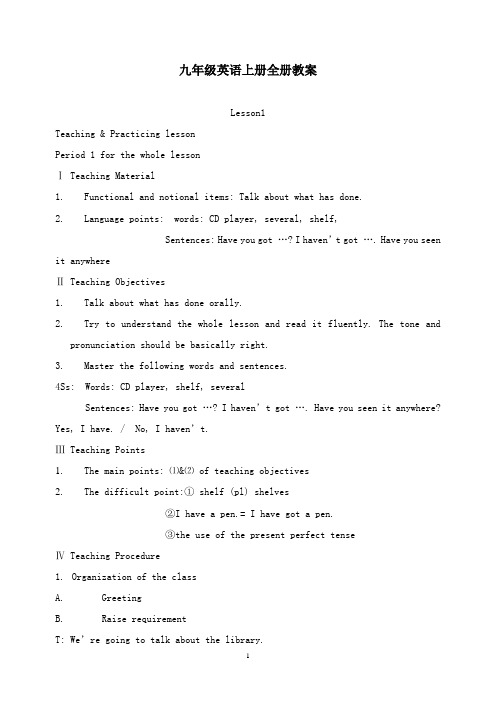
九年级英语上册全册教案Lesson1Teaching & Practicing lessonPeriod 1 for the whole lessonⅠ Teaching Material1.Functional and notional items: Talk about what has done.nguage points: words: CD player, several, shelf,Sentences: Have you got …? I haven’t got …. Have you seen it anywhereⅡ Teaching Objectives1.Talk about what has done orally.2.Try to understand the whole lesson and read it fluently. The tone andpronunciation should be basically right.3.Master the following words and sentences.4Ss: Words: CD player, shelf, severalSentences: Have you got …? I haven’t got …. Have you seen it anywhere? Yes, I have. / No, I haven’t.Ⅲ Teaching Points1.The main points: ⑴&⑵ of teaching objectives2.The difficult point:① shelf (pl) shelves②I have a pen.= I have got a pen.③the use of the present perfect tenseⅣ Teaching Procedureanization of the classA.GreetingB.Raise requirementT: We’re going to talk about the library.2.ReviewA.OralT: Do we have a library in our school? What do we have in the library? What can we do in the library?3.The teaching of the new lessonLesson 1T: Let’s learn Unit 1 In the library, Lesson 1. (write down the title) Teach: Have you got …?T: If you want to borrow a history book from the library, what do you say? Ss: Excuse me, do you have a history book?T: Yes, and we can also say: Have you got a history book?Write down the new sentence and compare the new one and the old one. Then teach the negative form and simple question form.And make more examples.Examples: He has got a good pen.They haven’t got any water.Our school has got a lot of students.B、Teach: Part 1T: Have you got a ruler? S1: Yes, I have. Here you are.T: Have you got an umbrella? S2: Sorry, I haven’t. Ask …Ask the Ss to use Part 1 to make new dialogue in pairs and then ask some to do it in front of the class. Teach “ CD player” at the same time.B.Teach: severalT: Have you got a pen? How many pens have you got?S1: FiveT: We may also say: “You’ve got several pens.”Write down the word: severalB.Teach: shelfT: Just now we talked about the library, we know there are many books in the library. Where are the books put?Teach: on the shelf shelf (pl) shelvesB.Part2T: Now I’d like you to make a dialogue talking about borrowing books about different subjects.Do it in pairs first then ask some to do it.Analysis: books about … at the moment = now = right nowB.Part 3Dialogue 1Listen and answer: Well, when you borrow books from the library, you must be careful, but Jim is not careful.What happened? Where was the book?Then read it and learn the dialogue.Analysis: Have you seen it anywhere? ( tense and the use of anywhere)Dialogue 2Listen and answer: How about Tom? What has he lost? Where was it? Read and learn.Analysis: have lost (tense)Perhaps he’s seen it. ( ‘s is short for has)I saw it on Lin Tao’s desk five minutes ago. ( tense)B. Conclusion1. have got = have 2 several = a few 3.on the shelf 4. the present perfect tenseA.Wb. Ex1 &24.Homework1.Do Wb. Ex 3&42.Recite Part 3Lesson 2Reading lesson2 periods for Lesson 2ⅠTeaching Materialsnguage points:Words: already, yard, schoolyard, step, librarian, probably, pay, sadly, mark, bookmarkPhrases: used to, put down, pay for, come up withSentences: Her hobby is reading.So was the librarian.Now her lost books are usually returned to the library.ⅡTeaching Objectives1.Read the whole lesson and try to understand its content. Make sure to answerthe questions in Wb correctly.2.Read the lesson fluently, the pronunciation and tone should be right.Ⅲ Teaching Points1.The main points---(1)&(2) in teaching objectives2.The difficult pointsA: already, “al” makes an / / soundB: the difference between “on” and “about”C: make sb. + adj.D: used to do sth.E: come up with an idea= think of an ideaPeriod 1Ⅳ Teaching Procedureanization of the classT: Today we are going to Lesson 2, in Lesson 2, we are going to talk about the library.2.ReviewT: Before we learn the new lesson, let’s go over what we learned yesterday.A.OrallyHave = have got eg. They don’t have any shelves.= They haven’t got any shelves. Has = has got eg. Does he have a CD player?= Has he got a CD player? Several=a fewOn the shelfThe construction and concept of the present perfect tenseB.Recite Part 2C.Wb. Ex33.The teaching of the new lessonA.Lesson 2T: We know we can borrow books from a library. But if we lose the books, what should we do? Let’s go on to learn Lesson 2, we will know the answer in it.( write down Lesson 2)B.pay forWell, you should pay for it.Teach: pay, paid, paidPay for : give money to sb. for sth.C.onT: Why do people like to go to the library?T: Because there are books on many different subjects.D.knowledgePeople can learn much knowledge from them.E.Part 1 Pre-readF.Part 2Ask the Ss the read the passage and answer questions in their Wb. Ex 1 G.Read and learnParagraph 1T: How old is the writer’s grandma?What was she?What is her hobby?Why does she love books?4.Homework.A. Read the end of the text and finish the exercises in Wb.Junior English for ChinaBook 3Lesson 3课型:讲练课ⅠTeaching Materials1.Functional and notional itemsAsk questions about something has donenguage MaterialsWords: encourage, once, abroad, copyPhrases: think of, encourage sb. to do sth., get sth. back, pick up Sentences: Have you ever been abroad? Yes, just once.I’ve just cleaned the kitchen.Really? I did that hours ago.Grammar: The difference between the present perfect tense and the past indefinite tenseⅡTeaching Objectives1.Learn to ask questions about something has done2.Read the whole lesson fluently, and pronunciation and intonation should beright.3.Master the following materials(4 skills) Words: once, copyPhrases: think of, pick upSentences: Have you been abroad? Yes, only once.(3 skills) Words: encourage, abroadPhrases: get sth. back, be abroadⅢ Teaching Points1.The main points: (1)&(2) in teaching objectives2.The difficult points:A.“ever, just, already”, they should be put in the middle of “ havedone”B. The difference between the present perfect tense and the past indefinite tense Ⅳ Teaching Procedureanization of the class2.RevisionBefore we go on to learn the new lesson, let’s go over what we learn in Lesson2.A.OralGrandma lost library books. If she really lose them, what should she do?Did the librarian have any ideas? What is it?What did they doB. Workbook Ex23.The teaching of the new lessonA.Lesson 3Can Grandma get all her lost books back? Let’s go on to learn Lesson 3.B.Read Part 1 and answer the following questions:Did Grandma get all her lost books back?How did she get them back?C.Read and learn*Think of:认为、想起、想出Eg: What do you think of it?I often think of my friends in Beijing.*Encourage sb. to do sth.Eg. The teacher thought a lot about how to encourage his students to study hard. *Pick up: pick it\them up*return sth. to sb.*get sth. from sb.D.Reading practiceE.Retell the storyF.Ask and answerHave you ever picked up a library book? Yes, I have\ No, I haven’t.Ask the students to ask and answer in pairs by using Part 2 and ask some to do it in class.Teach: abroad, onceDo Wb. Ex1G.Part 3Play and English songT: Have you ever listened to foreign music?Ss: Yes, we have.T: And we have just listened to it.Make sentences by using “ I have just…”Read and learnTeach: copyPoint out the difference between the present perfect tense and the past indefinite tense.The present perfect tense shouldn’t be used together with the past time.H.Conclusion●the use of “ever, just, already” in the present perfect tense ●the difference between the present perfect tense and the pastindefinite tense4.HomeworkA.Wb. EX2&3B.Go over the language pointsLesson 4课型:练习课ⅠTeaching Materialsnguage MaterialsWords: spoil, as, screenPhrases: on the computer, find outSentences: I guess somebody else has borrowed it.Could you find out who has taken it?Grammar: The present perfect tenseⅡTeaching Objectives4.Read the whole lesson fluently, and pronunciation and intonation should beright.5.Learn to read the information on the library cards and the computer screen.6.Master the following materials(4 skills) Word: asphrase: on the computer, find out(3 skills) Words: spoil, screenⅢ Teaching Points3.The main points: (1)&(2) in teaching objectives4.The difficult points: learn to read the information on the library cardsand the computer screenⅣ Teaching Procedureanization of the classToday, we are going to learn Lesson 4. In Lesson 4, we’re going to talk about the information on the library cards and the computer screen.6.RevisionBefore we go on to learn the new lesson, let’s go over what we learn in Lesson3.A.OralHow could Grandma get all her lost books back?the use of the adverbs in the present perfect tense.7.The teaching of the new lessonA.Lesson 4Yesterday, we learned that grandma usually borrowed books from the library. There is a new library today. If you want to read books, how can you find them? Let’s go on to learn Lesson 4.B.Part1I’d like you to listen and do Wb. Ex.1C.Part 2Ask the students to write down something about the school librarian and report it to the class. Teach: as He works there as a shop assistant.D.Part 4Learn to read the information on the cards and the computer screen.E.Part 3Listen and answer: What does the boy want to borrow?What’s its name?Who has borrowed it?Read and learn.has borrowed, has taken, has got( the present perfect tense)find outRead and act.F.Part 5Read and learn.G.Checkpoint 1H.Wb. Ex.2&58.HomeworkA.Wb. Ex 3B.Go over the whole unit.Lesson 5课型:讲练课ⅠTeaching Materials4.Functional and notional itemsA. Learn to ask how long sb. has done sth.B. Learn to talk about if someone has been to a place.nguage MaterialsWords: surf, surfing, surfer, wave, Hawaii, beach, twice, Bondi, none, Newquay, water-ski, canoePhrases: have a try, since last Wednesday, learn sth. from sb. how to do it, several timesSentences: What’s …like?How long have you been in Sydney?Have you ever been to …?Grammar: the present perfect tenseⅡTeaching Objectives7.Learn to ask questions about something has done8.Read the whole lesson fluently, and pronunciation and intonation should beright.9.Master the following materials(4 skills) Words: surf, surfing, surfer, wave, beach, twice, nonePhrases: have a trySentences: Have you been to…? Several times.(3 skills) Words: water-ski, canoe(1 skill) Words: Hawaii, Bondi, NewquayⅢ Teaching Points5.The main points: (1)&(2) in teaching objectives6.The difficult points:A.“ever, just, already”, they should be put in the middle of “ havedone”B. The difference between the present perfect tense and the past indefinite tense Ⅳ Teaching Procedureanization of the classToday, we’re going to talk about water sports.2. RevisionRevise the names of the sports they have learnt: roller-skating, skating, jump, race, skiing.10.The teaching of the new lessonA.Lesson 5And swimming is a kind of water sport because you have to swim in the water. Well, what other water sports do you know? Let’s go on to learn Unit 2 Water sports.e colour page1 to teach: surf, surfing, surfer, wave, water-skiing,canoe.C.Part 1Listen and answer: Who can surf, Ted or Bruce?How long has Bruce been in Sydney?Why did he come to Sydney?Who teach Bruce to surf?Read and learn:What’s …like? = How is …?Since last WednesdayLearn sth. from sb.Have you ever been to …?Have a tryHow to do itD.Read and act.E.Part 2Have you ever surfed?Have you ever been to Hawaii?Ask and answer in pairsLearn: Bondi, Cape Town, Newquay, noneNo one 人单数 No one is herenone 人/物单数/复数 None of them is here.F.Wb. Ex3. 2 . 1 .G.ConclusionSurf, surfing, surfer, waveHe’s a surfer. Have a tryHow long have you been in …?Have you ever been to …?11.Homeworkwb. Ex 2P.S.The writing on the blackboardUnit 2 Water sportsLesson 5surf ①What’s …like? = How is …? Have a try surfing ②How long have you been in …? learn sth. from sb.surfer Since last Wednesday no one 人/ 单wave ③Have you ever been to …? none人/物单/复Hawaii ④None of us has. none of us (true)Cape Town No one has. no one of us (false)Lesson 6ⅠTeaching MaterialsWords: describe, especially, attract, so-called, possible, since, part-time, although, fit, prize, competition, event, Olympic, Waikiki, Honolulu, SanFranciscoPhrases: all over, large numbers of, no matter, both…and…, give up, ever since, the Olympic GamesSentences: Now it is enjoyed by people all over the world.You can always find surfers out riding the waves.In the morning, he works as a part-time assistant in a surf shop. ⅡTeaching Objectives1.Try to understand the whole passage and read the whole lesson fluently andthe pronunciation and intonation should be right.2.Master the following materials:4Ss Words: describe, especially, attract, so-called, possible, since, part-time, although, fit, prize, competition, event, OlympicPhrases: all over, large numbers of, no matter, both…and…, give up, ever since, the Olympic GamesSentences: Now it is enjoyed by people all over the world.You can always find surfers out riding the waves.In the morning, he works as a part-time assistant in a surfshop.3.Master the following materials:3Ss Words: Waikiki, Honolulu, San FranciscoⅢ Teaching Points1.The main points: (1) &(2) in teaching objectives2.The difficult points: A. the use of “although” B. the use of “no matter”C. the use of “ both…and…”Ⅳ Teaching ProcedurePeriod 1anization of the classTalk about surfing2.ReviewHave you ever been to Qingdao?Who has ever been to Bondi Beach? None of us.Has anybody water-skied before? Nobody has.3.The teaching of the new lessonA.Lesson 6In Lesson 5, we learned some water sports. Today, we are going to talk about oneof them----surfing.B.Talk about surfingWhere is the best place for surfing? Why?Have you ever watched people surf?What do you think of it?Ask the students to say something about it.Teach: fit, prize, competitionSurfing will make you fit( healthy). Maybe you can take part in a surfing competition, then you may win a prize.Part 1 Pre-read Ask and answer then teach: watch sb. do sth.; describe sth.C.Part 2Read and do wb. Ex.1D.Conclusion.fit, win a prize4.HomeworkA.Go over what we learn todayB.Read the passage and find out all the new words, try to guess theirmeaning.Period 2Teaching Procedureanization of the classLearn the passage2.ReviewWatch sb. do sth.; fit(healthy); win a prize3.The teaching of the new lessonA. Paragraph 1Find out the key sentence. Then learn the new language points.one of…; be enjoyed by sb.; all over the world= everywhere in the world; be famous for\ as; especially; attract sb. to somewhere; large numbers of people(it is used to modify countable nouns)= a number ofRead this paragraph after the tape and then read it together. Ask some to read it in classB. Paragraph 2Find out the key sentence. Then learn the new language points..Read this paragraph after the tape and then read it together. Ask some to read it in classC.Paragraph 3Find out the key sentence. Then learn the new language points.D.Paragraph 4Find out the key sentence. Then learn the new language points.E.Conclusion4. HomeworkA.Wb. Ex. 2&3B.Retell the storyLesson 7课型:讲练课ⅠTeaching Materials1.Functional and notional itemsLearn to talk about something has donenguage materialsWords: such, fail, practice, New Zealand, businessPhrases: such great fun, on business, so farSentences: Time flies!He’s gone to New Zealand on business.ⅡTeaching Objectives1.Learn to talk about something has done.2.Try to understand the content and read the dialogue fluently, thepronunciation and intonation should be right.3.Master the following materials:4 skills Words: such, fail, practice, businessPhrases: so far, on businessSentences: He’s gone to …4.Master the following materials:2 skills Words: New ZealandⅢTeaching Points1.The main points: (1) & (2) in teaching objectives2.The difficult pointsA.such great funsuch+adj. +n.(不可数/复数)such a + adj. + n.(可数名词单数)与 so的区别B.have been surfingC.practice sth.\ doing sth.D.gone to & been togone to去了,强调不在说话地点been to 去过,强调对某地有所了解,可以在说话地点ⅣTeaching Procedureanization of the classWe are going to talk about Bruce and Ted again. In grammar, we are going to talk about the present perfect tense.2.RevisionA.Retell the story in Lesson 6.B.Wb. Ex2&33.The teaching of the new lessonA.Lesson 7In lesson 5, we know Bruce will show Ted how to surf. Can Ted surf now?B.Listen and answerCan Ted surf? What has Bruce been doing every day? Why?When is Ted leaving for home?How about Bruce?Where is Bruce’s uncle?C.Read and learnTeach: *on Bondi Beach*such great fun: very funnysuch+adj. +n.(不可数/复数) such beautiful flowerssuch a + adj. + n.(可数名词单数) such a beautiful flowerso+ adj. So beautiful a flower如果在数量词“many, much, few, little”前,要用“so”eg: so much water, so many people* fail (in) the examfail to do sth.=can’t do sth.eg: fail the exam=not pass the examfail to catch the bus= miss the bus* need more practicepractice: 练习,实践(为不可数名词)如: Practice makes perfect.Practice : 练习(为及物动词)如:practice doing sth.* Time flies.* gone to去了,强调不在说话地点been to 去过,强调对某地有所了解,可以在说话地点eg: Where is he? He’s gone to his home.* on businessD.Reading Practice.E.Part 2 Ask and answeryet 用于否定句,一般疑问句及条件状语从句already用于肯定句,如果用于一般疑问句则表示惊讶的语气F.Answer the questions in groups. Teach: so far: up to now Ask some to do it in classG.ConclusionH.Wb. Ex 14.HomeworkA.Recite Part 1B.Go over the whole lessonLesson 8课型:练习课ⅠTeaching MaterialsWords: cross, channel, mainland, slow, journey, among, proud, pride, unless, shot, truthPhrases: come true, slow down, be proud of, speak highly of, not only…but also… Sentences: Among them were his parents.He is not only the pride of our school, but also the pride of all the people in Hainan.ⅡTeaching Objectives1.Read the passage in Part 3 and try to understand its meaning. Read it fluentlyand the pronunciation and intonation should be right.2.Finish all the exercises in this lesson.3.Master the following materials as four skills:Words: cross, channel, mainland, slow, journey, among, proud, pride, Phrases: come true, slow down, be proud of, speak highly of, not only…but also…Sentences: Among them were his parents.He is not only the pride of our school, but also the pride of all thepeople in Hainan.4. Master the following materials as three skills: words: unless, shot, truth ⅢTeaching Points1.The main points: (1) & (2) in teaching objectives2.The difficult points: not only…but also…如果连接两个主语时,用就近一致原则。
人教版九年级英语全一册精品教案
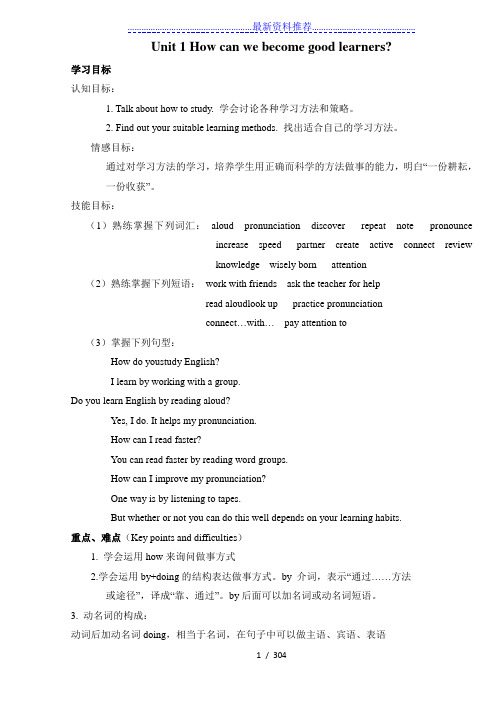
Unit 1 How can we become good learners?学习目标认知目标:1. Talk about how to study. 学会讨论各种学习方法和策略。
2. Find out your suitable learning methods. 找出适合自己的学习方法。
情感目标:通过对学习方法的学习,培养学生用正确而科学的方法做事的能力,明白“一份耕耘,一份收获”。
技能目标:(1)熟练掌握下列词汇:aloud pronunciation discover repeat note pronounceincrease speed partner create active connect reviewknowledge wisely born attention(2)熟练掌握下列短语:work with friends ask the teacher for helpread aloudlook up practice pronunciationconnect…with…pay attention to(3)掌握下列句型:How do youstudy English?I learn by working with a group.Do you learn English by reading aloud?Yes, I do. It helps my pronunciation.How can I read faster?You can read faster by reading word groups.How can I improve my pronunciation?One way is by listening to tapes.But whether or not you can do this well depends on your learning habits.重点、难点(Key points and difficulties)1. 学会运用how来询问做事方式2.学会运用by+doing的结构表达做事方式。
新人教版九年级英语上册全册教案
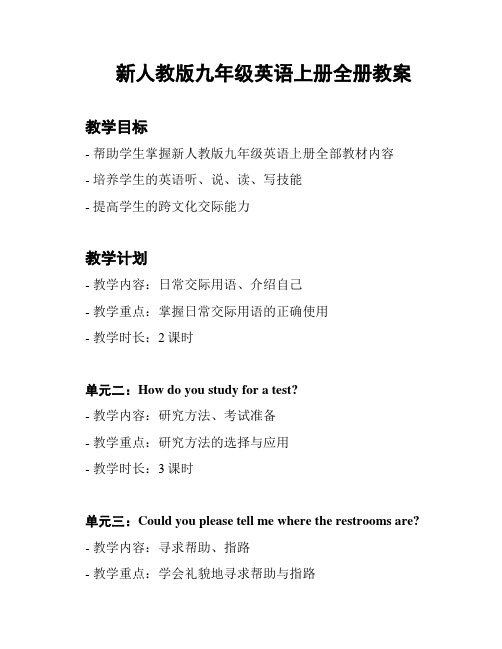
新人教版九年级英语上册全册教案教学目标- 帮助学生掌握新人教版九年级英语上册全部教材内容- 培养学生的英语听、说、读、写技能- 提高学生的跨文化交际能力教学计划- 教学内容:日常交际用语、介绍自己- 教学重点:掌握日常交际用语的正确使用- 教学时长:2课时单元二:How do you study for a test?- 教学内容:研究方法、考试准备- 教学重点:研究方法的选择与应用- 教学时长:3课时单元三:Could you please tell me where the restrooms are? - 教学内容:寻求帮助、指路- 教学重点:学会礼貌地寻求帮助与指路- 教学时长:2课时单元四:I used to be afraid of the dark.- 教学内容:过去的经历和惯- 教学重点:掌握过去式的使用- 教学时长:2课时单元五:What are the benefits of going green?- 教学内容:环境保护、可持续发展- 教学重点:理解环境保护的重要性- 教学时长:3课时单元六:I love music that I can dance to.- 教学内容:音乐、电影与艺术- 教学重点:学会表达自己对音乐、电影和艺术的喜好和感受- 教学时长:2课时单元七:Teenagers should be allowed to choose their own clothes.- 教学内容:青少年的权利与责任- 教学重点:理解和讨论青少年应有的权利与责任- 教学时长:3课时单元八:Reading for pleasure- 教学内容:阅读和写作- 教学重点:培养学生的阅读兴趣和写作能力- 教学时长:4课时单元九:Wildlife protection- 教学内容:野生动物保护- 教学重点:了解野生动物保护的重要性,并表达自己的看法- 教学时长:2课时单元十:Musical instruments- 教学内容:乐器与音乐- 教学重点:了解各种乐器和音乐类型,并能进行简单的介绍- 教学时长:3课时教学评价- 结合课堂表现、作业成绩、测试等多种评价方式进行评价- 通过个人表现、小组合作等方式培养学生的主动研究能力- 鼓励学生参与课堂互动,提高口语表达能力参考资料- 教材:新人教版九年级英语上册- 辅助教材:听力材料、课外阅读材料等。
最新 人教版九年级 英语上册全册教案
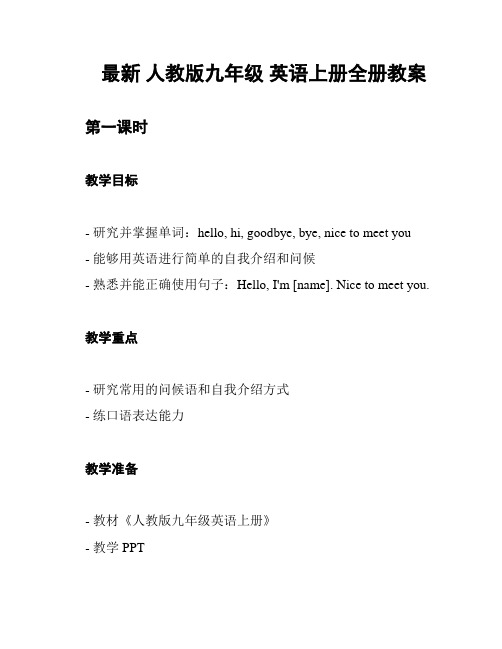
最新人教版九年级英语上册全册教案第一课时
教学目标
- 研究并掌握单词:hello, hi, goodbye, bye, nice to meet you
- 能够用英语进行简单的自我介绍和问候
- 熟悉并能正确使用句子:Hello, I'm [name]. Nice to meet you. 教学重点
- 研究常用的问候语和自我介绍方式
- 练口语表达能力
教学准备
- 教材《人教版九年级英语上册》
- 教学PPT
教学步骤
1. 导入新课,向学生简要介绍本节课的内容,并激发学生研究
的兴趣。
2. 分发教材,让学生跟读单词:hello, hi, goodbye, bye, nice to meet you。
3. 解释单词的意思,帮助学生掌握词汇。
4. 利用示范和展示图片等方式,让学生理解并掌握句子:Hello, I'm [name]. Nice to meet you.
5. 引导学生进行口语练,让他们用所学内容进行自我介绍和问候。
6. 收集学生的口语表达,进行点评和纠正。
7. 结束本节课,作简单复,并布置下节课的预内容。
教学延伸
- 练更多的问候语和自我介绍方式,丰富学生的口语表达能力。
- 制作小组或角色扮演活动,让学生在真实情境中运用所学内容。
教学评价
- 观察学生的参与程度和口语表达能力,及时给予鼓励和指导。
- 收集学生的口头回答、书面练习,进行评估和改进教学策略。
人教版九年级英语全册教案4篇
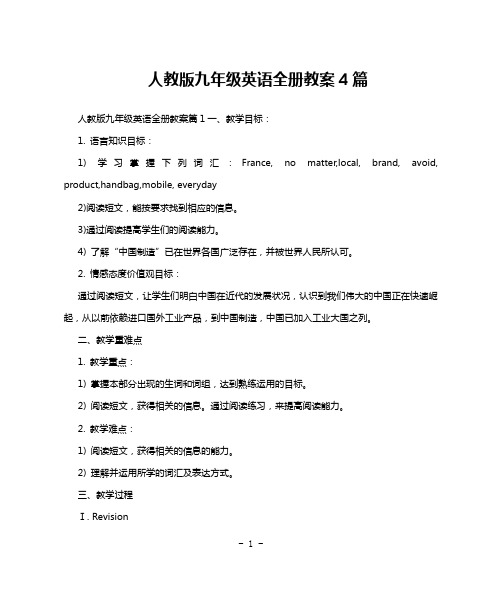
人教版九年级英语全册教案4篇人教版九年级英语全册教案篇1一、教学目标:1. 语言知识目标:1) 学习掌握下列词汇:France, no matter,local, brand, avoid, product,handbag,mobile, everyday2)阅读短文,能按要求找到相应的信息。
3)通过阅读提高学生们的阅读能力。
4) 了解“中国制造”已在世界各国广泛存在,并被世界人民所认可。
2. 情感态度价值观目标:通过阅读短文,让学生们明白中国在近代的发展状况,认识到我们伟大的中国正在快速崛起,从以前依赖进口国外工业产品,到中国制造,中国已加入工业大国之列。
二、教学重难点1. 教学重点:1) 掌握本部分出现的生词和词组,达到熟练运用的目标。
2) 阅读短文,获得相关的信息。
通过阅读练习,来提高阅读能力。
2. 教学难点:1) 阅读短文,获得相关的信息的能力。
2) 理解并运用所学的词汇及表达方式。
三、教学过程Ⅰ. Revision1. Ask Sstorole-play the conversation in 2d.2. Checkthehomework. Let some Ss tell read their sentences.(1). This ringismade of silver.(2). This kindofpaper is made from wood.(3). What ispaintmade from?(4). Hang Zhouisfamous for tea.(5). As far asIknow, tea plants are grown on the sides of the mountains.Ⅱ. Lead in1. 展示一段伦敦奥运会礼品的视频,让学生了解中国制造已被世界人民所接受。
Then ask Sssomequestions:T: As we know,thereare so many things made in China in England. What about in America andothercountries in the world? Now let’s read the passage of 3a.First, readquickly and find the answer to this question:1) Where did KangJianvisit last year?2) Were theremanythings made in China in the US?3) What twothingsdid Kang Jian want to buy in the US?4) Where weretheymade?Ss read thearticlequickly and try to answer the questions:2. 方法指导:带着问题,然后快速阅读短文,争取在较短的时间内,找到答案。
人教版九年级上册英语教案(优秀8篇)

人教版九年级上册英语教案(优秀8篇)作为一位兢兢业业的人民教师,总归要知道如何编写一份优秀的教案。
这次为您整理了8篇《人教版九年级上册英语教案》,亲的肯定与分享是对我们最大的鼓励。
九年级上册英语教案篇一一、教学内容本课是第二单元的最后一课,阅读课,是本单元话题过去的某种状态的延伸和继续。
文章讲得主要内容是一个老是惹麻烦的男孩在明白了母亲对他的爱之后变成一个好孩子的故事。
二、教学目标⑴掌握一些主要的词汇和句型used to be like 等。
⑴引导学生理解课文内容,掌握阅读技巧,如扫读、细读、概括文章大意,利用上下文信息猜词等。
⑴通过阅读课文,并设计各种活动训练学生运用英语进行听说读写各种活动的能力。
⑴激发学生感恩父母,热爱父母,关注身边的人的情感。
三、教学重点和难点⑴训练学生利用上下文信息填写词汇和句子的能力。
⑴培养学生的阅读策略和写作能力。
⑴利用本课所学知识表达个人意见,对课文进行深层理解。
四、设计理念依据纽南(David Nunan)所提出的任务型及合作式教学原则,使学生在小组学习中获取信息,处理信息和运用信息,激发学生用所学语言进行交际的愿望和自信心,促进合作精神和文化意识的发展。
五、教学设计1. 总体思路:本节课是在多媒体的课堂教学环境下实施的大容量、快节奏的课堂教学。
笔者先让学生简短描述父母以前和现在的职业,外貌,性格,爱好再欣赏英文歌曲thank you, dad. 导入,酝酿了一种感激父母的氛围,接着引导他们畅诉父母对自己的帮助的故事,然后让学生阅读短文,感受母亲爱的伟大。
在阅读过程中,通过让学生看标题,预测课文内容、概括文章段落大意、根据上下文填所缺的句子,判断正误等各种方式提高阅读技能。
最后,笔者提供关键词让学生复述课文,使其能熟练得掌握所学的重点词汇、短语和句子。
阅读后,笔者抛出这样的问题让学生讨论:我们该用什么方式报答父母?培养学生反哺意识。
最后通过写作,提高学生综合运用语言的能力。
人教版九年级英语上册 教案(全)【精品】
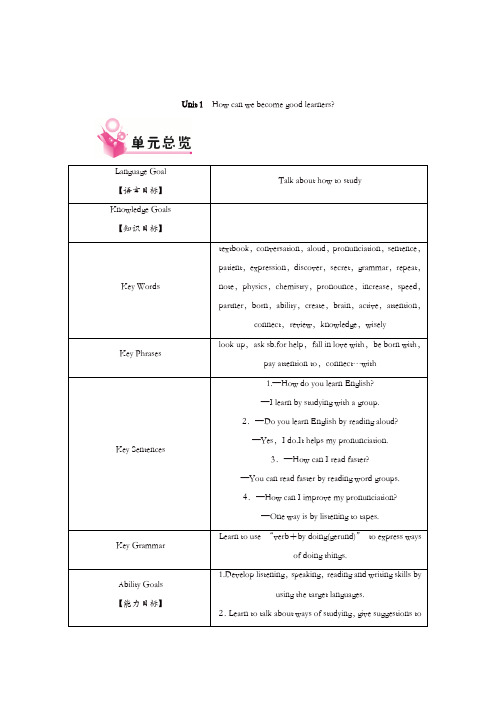
Unit 1How can we become good learners?本单元围绕学习的话题,讲述了学习的障碍及对应的解决方法,对学生的学习有重要意义。
Section A内容上侧重英语学习的方法,学生要学习、训练相关的语言内容和技能。
学生要重点掌握并能熟练、正确地运用与学习主题相关的单词和各种表达学习方法的短语、功能及句型结构How do you study/learn…?I study/learn…by…How can I…?You can…by…;以及学会用“by+v.-ing形式”结构来表达方式方法。
Section B在Section A谈论英语学习的基础上,在话题上,从英语的学习困难及解决方案,拓展到优秀学习者的学习习惯;在语言上,巩固和丰富了与学习相关的话题词汇;在技能上,将听、说能力综合,突出阅读训练,由读促写;在策略上,引导学生关注优秀学生的学习方式,并借鉴运用;在情感上,鼓励学生面对困难,积极探索解决方案,不断改进学习方法,提高学习效率。
The First Period—Section A(1a-2d)Teaching Important Points【教学重点】Key words & phrases:textbook,conversation,aloud,pronunciation,sentence,patient;study for,ask the teacher for help,work with a group,be patient1.—How do you study for a test?—I study by working with a group.2.—Does anyone learn English by watching videos?—No.It's too hard to understand spoken English.3.—Have you ever studied with a group?—Yes,I have.I've learned a lot that way.Key structure:verb+by doingeg:I study by working with a group.Teaching Difficult Points【教学难点】★Practice the structure “verb+by doing”in listening and speaking.Teaching Aids【教学工具】A tape recorder,CAI or multimedia courseware.Teaching Steps【教学过程】★Step 1Leading in【新课导入】(Ⅰ)1.GreetingGreet the class and briefly talk with the students about their holidays.2.DiscussingDiscuss with the students,like this:T:What do you usually do when you study English?S1:I often read English books.T:(To class) Good.He studies English by reading English books.That's a good way.(Then to another student)Now,what do you usually do when you study English?S2:I…3.Practice with more students.★Step 1Leading in【新课导入】(Ⅱ)1.GreetingGreet the class and tell the students the goal of this unit.2.PreparationT:Today we are going to talk about how to study.How do you study English?Collect the students' answers and prepare the language items for this period.★Step 2Cooperative inquiry【合作探究】1.Finish the task in 1a①Work in groups.Add more ways of studying English.②Read these phrases in 1a.Tell them the usage of “by doing”phrases.③Help students to say out their ways of studying.2.Finish the task in 1b①Read the instructions.②Play the recording for the first time.Students only listen.③Play the recording a second time.Ask them to match the ways with the names.④Check the answers with the whole class.3.Finish the task in 1c①In groups,interview their partners about how they study for a test.②One from each group reports to the class.4.Finish the tasks in 2a-2b①Use PPT or pictures for the students to learn the new words.Read the questions in 2a.②Get the students to guess the answers in 2b.③Play the recording for the first time.Students listen and check the questions.④Play the recording again.Students listen and match the answers with the questions in 1a.⑤Check the answers with the whole class.5.Finish the task in 2c①Show the pictures of the conversations.②Students work in pairs.③Ask three pairs to say out their conversations to the class.Show the PPT to help.6.Finish the task in 2d①Talk about the picture and scan the conversation.②Ask the students to read aloud the conversation in 2d.Learn the new words and phrases.③Ask these questions:How does Jack feel at the very start?What makes him feel like this(nervous)?What's Jack's problem when he reads?And what does Annie suggest?What's Jack's problem with words?And what's Annie's advice?④Check the answers with individual students to see how well they understand.⑤Play the recording and get the students to follow the teacher in the recording.Then ask two pairs to act out the conversation.★Step 3Homework1.Do a survey:How do you study for an English test?2.Imagine that you are Jack and Annie.Make a conversation to talk about your English study.3.Translate the following sentences into English.(1)你是怎样学习英语的?我通过大量阅读来学习。
最新人教版九年级英语上册教案(全册)
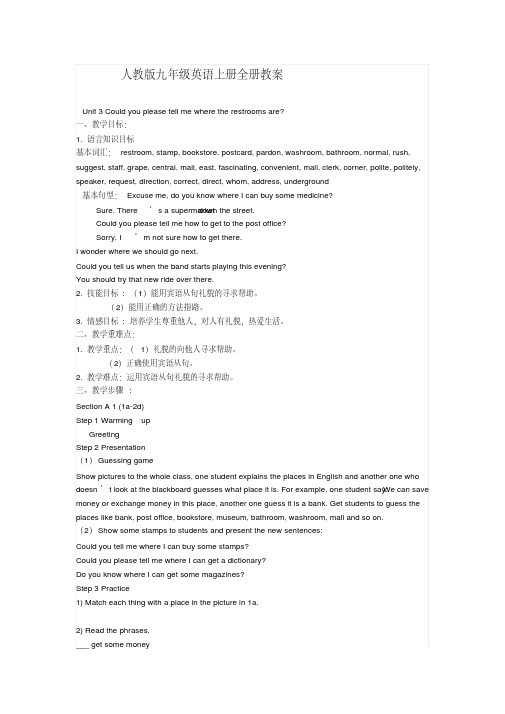
人教版九年级英语上册全册教案Unit 3 Could you please tell me where the restrooms are?一、教学目标:1. 语言知识目标基本词汇:restroom, stamp, bookstore, postcard, pardon, washroom, bathroom, normal, rush, suggest, staff, grape, central, mail, east, fascinating, convenient, mall, clerk, corner, polite, politely, speaker, request, direction, correct, direct, whom, address, underground基本句型:Excuse me, do you know where I can buy some medicine?down the street.Sure. There’s a supermarketCould you please tell me how to get to the post office?Sorry, I’m not sure how to get there.I wonder where we should go next.Could you tell us when the band starts playing this evening?You should try that new ride over there.2. 技能目标: (1)能用宾语从句礼貌的寻求帮助。
(2)能用正确的方法指路。
3. 情感目标: 培养学生尊重他人,对人有礼貌,热爱生活。
二、教学重难点:1. 教学重点:(1)礼貌的向他人寻求帮助。
(2)正确使用宾语从句。
2. 教学难点:运用宾语从句礼貌的寻求帮助。
三、教学步骤:Section A 1 (1a-2d)Step 1 Warming –upGreetingStep 2 Presentation(1)Guessing gameShow pictures to the whole class, one student explains the places in English and another one who doesn’t look at the blackboard guesses what place it is. For example, one student say: We can save money or exchange money in this place, another one guess it is a bank. Get students to guess the places like bank, post office, bookstore, museum, bathroom, washroom, mall and so on.(2)Show some stamps to students and present the new sentences:Could you tell me where I can buy some stamps?Could you please tell me where I can get a dictionary?Do you know where I can get some magazines?Step 3 Practice1) Match each thing with a place in the picture in 1a.2) Read the phrases.___ get some money___ get some magazines___ have dinner___ get a dictionary___ get some information about the town___ buy a newspaper___ buy some stamps___ get a pair of shoesStep 4 ListeningListen and complete the conversations in the picture in 1a. Then check the answers with the whole class.Step 5 PracticeMake conversations using the information in 1a. Then talk about your own city. For example:A: Excuse me, could you please tell me how to get to the bookstore?B: Sure, just go along Main Street until you pass Center Street. The bookstore is on your right, beside the bank.A: Thanks. Do you know when the bookstore closes today?B: It closes at 7:00 p.m. today.A: Thank you!B: You’re welcome.Step 6 Listening1. Listen and number the directions in the order that you hear them.2a You will hear some of the directions below. Number the directions in the order you hear them. ___ Go to the bird floor.___ Turn left.___ Go to the second floor.___ Turn right.___ The supermarket is between the flower store and the bookstore.___ Go past the bookstore.2. Listen again. Show how the boy walks to the supermarket. Draw a line in the picture in 2a. Then get one student draw the line on the blackboard.3. Listen the third time and answer the questions.1) Excuse me, can you tell me where I can buy some medicine?2) Do you know how to go there?3) OK, great. Oh, and one more thing. Do you know when this shopping center closes tonight?4) OK, thanks a lot.Step 7 PairworkMake conversations about the other places in the picture in 2a.A: Excuse me. Can you tell me where I can buy some stamps?B: Yes, there’s a post office in this shopping center.A: Do you know how to go there?B: Yes. Go to the third floor and turn right. Then go past the bank. The post office is betweenmuseum and library. You should be able to get stamps.A: OK, great. Oh, and one more thing. Do you know …B: I’m not sure, but you …A: OK, thanks a lot.B: You’re welcome.Step 8 Reading1. Read the conversation in 2d and answer the questions.2. Role – play the conversation.3. Explain the language pints in 2d.(1) Go along Main Street until you pass Center Street.1) until和till同义为“直到……” ,till多用于口语,until可以放在句首,till则不能放在句首。
人教版九年级英语教案(全册)
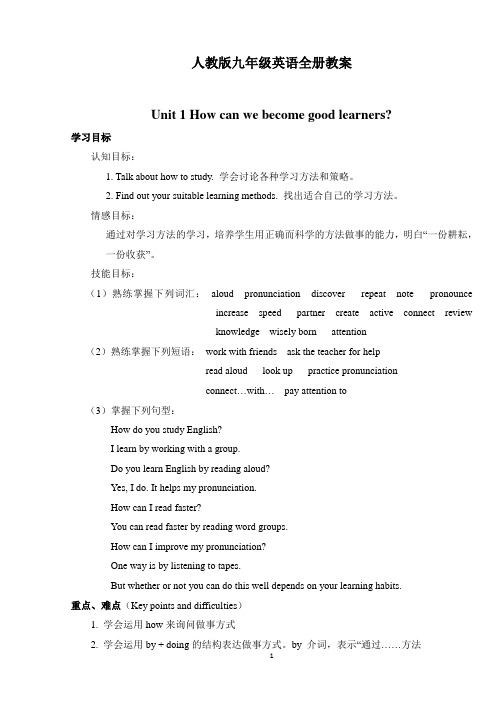
人教版九年级英语全册教案Unit 1 How can we become good learners?学习目标认知目标:1. Talk about how to study. 学会讨论各种学习方法和策略。
2. Find out your suitable learning methods. 找出适合自己的学习方法。
情感目标:通过对学习方法的学习,培养学生用正确而科学的方法做事的能力,明白“一份耕耘,一份收获”。
技能目标:(1)熟练掌握下列词汇:aloud pronunciation discover repeat note pronounceincrease speed partner create active connect reviewknowledge wisely born attention(2)熟练掌握下列短语:work with friends ask the teacher for helpread aloud look up practice pronunciationconnect…with…pay attention to(3)掌握下列句型:How do you study English?I learn by working with a group.Do you learn English by reading aloud?Yes, I do. It helps my pronunciation.How can I read faster?You can read faster by reading word groups.How can I improve my pronunciation?One way is by listening to tapes.But whether or not you can do this well depends on your learning habits.重点、难点(Key points and difficulties)1. 学会运用how来询问做事方式2. 学会运用by + doing的结构表达做事方式。
人教版九年级英语全册教案4篇
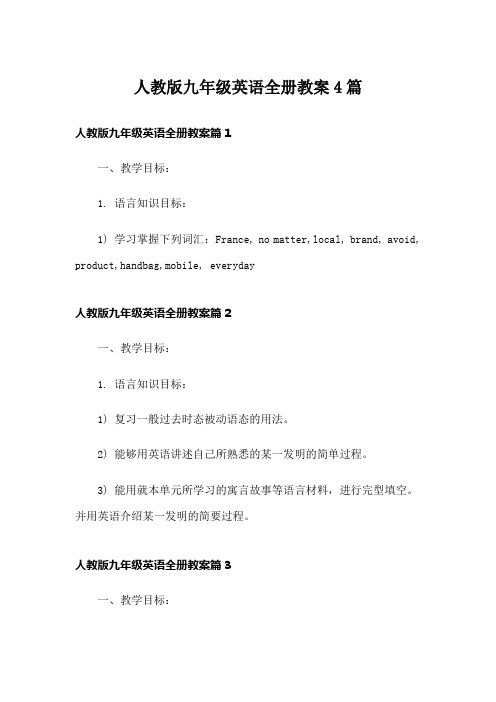
人教版九年级英语全册教案4篇人教版九年级英语全册教案篇1一、教学目标:1. 语言知识目标:1) 学习掌握下列词汇:France, no matter,local, brand, avoid, product,handbag,mobile, everyday人教版九年级英语全册教案篇2一、教学目标:1. 语言知识目标:1) 复习一般过去时态被动语态的用法。
2) 能够用英语讲述自己所熟悉的某一发明的简单过程。
3) 能用就本单元所学习的寓言故事等语言材料,进行完型填空。
并用英语介绍某一发明的简要过程。
人教版九年级英语全册教案篇3一、教学目标:1. 语言知识目标:1) 学习掌握下列单词和短语:block, in linewith, worker, stare, disbelief, above,burn, burning, alive, airport, till ,west2) 能掌握以下句型:Life is full oftheunexpected.I was about to goupwhen I decided to get a coffee first.As I was waitinginline with other office workers, I heard a loud sound.Before I coldjointhe others outside to see what was going on, the first plane had alreadyhit myoffice building.3) 进一步熟练掌握过去完成时的用法。
2. 情感态度价值观目标:1) 通过学习使学生认识到生活中充满着许多出乎预料的事件,培养学生正确看待事物的积极心态。
2)能运用所掌握的语法,句型和词汇进行交流。
3)能比较流利地讲述自己曾经有的特别的一天。
二、教学重难点1. 教学重点:1)掌握本课时中出现的生词block, in linewith,worker, stare, disbelief, above, burn, burning, alive, airport, till ,west2) 学会用过去完成时叙述自己曾经有的特别的一天。
新人教版初中英语九年级上册全册教案
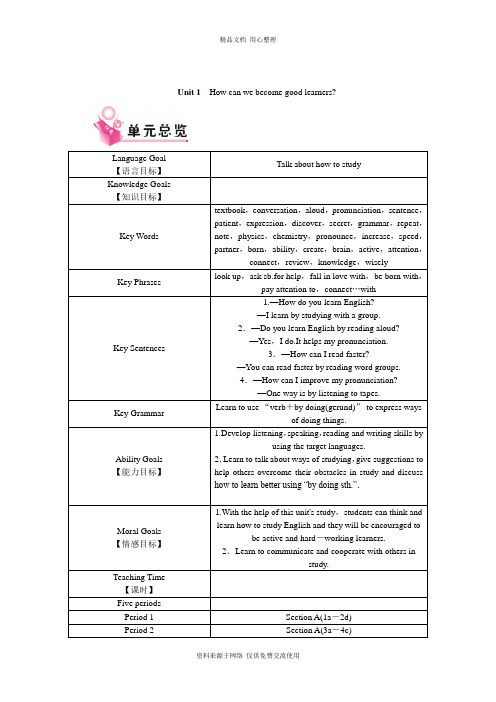
Unit 1How can we become good learners?Language Goal【语言目标】Talk about how to study Knowledge Goals【知识目标】Key Words textbook,conversation,aloud,pronunciation,sentence,patient,expression,discover,secret,grammar,repeat,note,physics,chemistry,pronounce,increase,speed,partner,born,ability,create,brain,active,attention,connect,review,knowledge,wiselyKey Phrases look up,ask sb.for help,fall in love with,be born with,pay attention to,connect…withKey Sentences1.—How do you learn English?—I learn by studying with a group. 2.—Do you learn English by reading aloud?—Yes,I do.It helps my pronunciation.3.—How can I read faster?—You can read faster by reading word groups. 4.—How can I improve my pronunciation?—One way is by listening to tapes.Key Grammar Learn to use “verb+by doing(gerund)” to express waysof doing things.Ability Goals 【能力目标】1.Develop listening,speaking,reading and writing skills byusing the target languages.2.Learn to talk about ways of studying,give suggestions to help others overcome their obstacles in study and discuss how to learn better using “by doing sth.”.Moral Goals 【情感目标】1.With the help of this unit's study,students can think and learn how to study English and they will be encouraged to be active and hard-working learners. 2.Learn to communicate and cooperate with others instudy.Teaching Time【课时】Five periodsPeriod 1 Section A(1a-2d) Period 2 Section A(3a-4c)Period 3 Section B(1a-1e)Period 4 Section B(2a-2e)Period 5 Section B(3a-3b) & Self Check本单元围绕学习的话题,讲述了学习的障碍及对应的解决方法,对学生的学习有重要意义。
人教版新目标九年级上册英语全册教案集
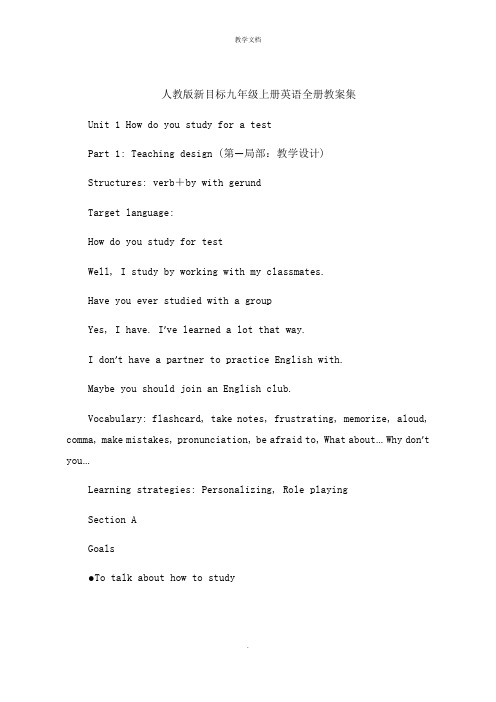
人教版新目标九年级上册英语全册教案集Unit 1 How do you study for a testPart 1: Teaching design (第—局部:教学设计)Structures: verb+by with gerundTarget language:How do you study for testWell, I study by working with my classmates.Have you ever studied with a groupYes, I have. I’ve learned a lot that way.I don’t have a partner to practice English with.Maybe you should join an English club.Vocabulary: flashcard, take notes, frustrating, memorize, aloud, comma, make mistakes, pronunciation, be afraid to, What about…Why don’t you…Learning strategies: Personalizing, Role playingSection AGoals●To talk about how to study●To read about how to studyProceduresWarming up by greetingHello, everyone!From now on you are a ninth grader. Congratulations to you and I wish you a great success in your studies!Today we shall take up the first unit in this new term, Unit 1 How do you study for a testLook at the blackboard and read after me the target language for this unit. When you read pay attention to the structure of the sentence.▲How do you study for test▲Well, I study by working with my classmates.▲Have you ever studied with a group▲Yes, I have. I’ve learned a lot that way.▲I don’t have a partner to practice English with.▲Maybe you should join an English club.Learning to Learn is very important. And learning to pass a test is also very important to you.Learning couldn’t be easier!If you have not developed good ways or methods to study for a test, talk to your classmates about it, your parents, or the teacher like me if you are brave enough. You should be brave enough to talk to others about your problems with your studies.Next I’d like to give you some useful practical advice about studying for a test and also ask you questions to make you think about things such as:▲using your time effectively▲motivation▲how to learn your lessons in the ninth grade year▲different modes of teaching you may meet▲how to develop particular skills, such as note-taking in class 1A: Checking the ways you studyNext turn to page 2 and check √ the ways you study for an English test. Then add other ways you use sometimes.▲How do you study for a testI study for a test___By reading to the tape; By underlining the expressions; By reading beyond the text; By doing used exam papers; By going over exercises books; By copying down the text; By learning the text by heart; By speakingwith classmatesNow raise your hand and report your added ways to the class. I will make a list of all the added ways on the blackboard.1b Listening and writingListen to understand how these people in the picture on page 2 study for a test. Write letters from the pictures. While listening, pay attention to the structures of the sentences.Section A 1b TapescriptBoy1: Hey, gang. There’s a big test on Tuesday. I really need some help. Can you tell me how you study for a big testVoices: Sure! Yes. Sure we will.Boy1: You did really well on the last English test, didn’t you, Mei Girl1: Yeah, I did OK.Boy1: Well, how did you study?Girl1: By making flashcards.Boy1: Maybe I’ll try that. How did you study, PierreBoy2: By asking the teacher for help. She was really happy I asked.Boy1: That’s interesting. How do you study, AntonioBoy3: I like to study by listening to cassettes. But sometimes mymother thinks I’m listening to music. And then she gets mad.Boy1:Oh, well…1c Doing a pairworkNow in pairs ask your partner how he or she studies for a test.A: How do you study for a testB: I study by working with a group.C: I study by listening to English.D. I study by playing games with my classmates.E. I study by doing actions such as coloring, matching.F. I study by singing English songs.G. I study by writingletters and emails.H. I study by acting out simple dialogues.I. I study by listening to and understanding stories.J. I study by writing simple sentences.K. I study by imitating from the recording.L. I study by speaking out words or phrases.M. I study by doing simple role plays.N. I study by reading and understanding simple stories.O. I study by using daily expressions.P. I study by performing short plays.Q. I study by performing simple rhymes.R. I study by writing sentences for pictures.S. I study by writing out simple poems.T. I study by reading aloud correctly.U. I study by playing text plays.V. I study by working with classmates.W. I study by going over the text before class.X. I study by copying words and expressions.Y. I study by looking and saying.Z. I study by asking others questions.2a Listening and checkingNow let’s go to page 3. Listen to the tape and check the questions you ask.While listening, pay attention to the structures of the sentences.Section A 2a, 2b TapescriptGirl1: Welcome to the English club. Today we’re going to talk about the best ways to learn English. Who has an ideaBoy1: Do you learn English by watching English-language videos Girl2: No. It’s too hard to understand the voices.Boy1: What about keeping a diary in English Do you learn English that wayGirl2: I think so. It helps to write English every day.Girl3: Have you ever studied with a groupGirl2: Yes, I have! I’ve learned a lot that way.Girl1: Do you ever practice conversations with a friendGirl2: Oh, yes. It improves my speaking skills.Boy1: What about reading aloud to practice pronunciationGirl3: I do that sometimes. I think it helps.Boy2: I do too. And I always look up new words in a dictionary.Girl3: That’s a great idea!2b Listening and matchingListen again and match each question from 2a with an answer in the box on page 3.2c Doing a pairworkNext we are going to make a conversation in pairs using the information from activities 2a and 2b.A: Have you ever studied with a groupB: Yes, I have. I’ve learned a lot that way.A: Have you ever learned English by watching videosB: Yes, I have. I’ve learned a lot that way.A: Have you ever practiced conversations with friendsB: Yes, I have. I’ve learned a lot that way.A: Have you ever listened to tapesB: Yes, I have. I’ve learned a lot that way.A: Have you ever read aloud to practice pronunciationB: Yes, I have. I’ve learned a lot that way.3a Reading the article and completing the chart1.Reading to the tapeWe are going to read the article on page 4. First we shall read to the tape together. That is, we start reading aloud as the recorder goes, and we stop reading aloud as the recorder stops. While reading, let’s pay enough attention to the pauses, the pronunciation and the intonation of the native reader. Make our reading aloud as the same as the reader’s.2.Reading and dividing the article into partsNext we are going to read aloud the article slowly and clearly. We will try to divide it into thought groups.3.Reading and underliningWe shall read the article once again, this time, to underline all the useful expressions in it. After school, you are going to write them down in your notebook.This week/ we asked students/ at New Star High School/ about the best ways/ to learn more English. Many said/ they learnt/ by using English. Some students had more specific suggestions. Lillian Li, for example, said/ the best way/ to learn new words/ was by reading English magazines. She said that/ memorizing the words of pop songs/ also helped/ a little. When we asked about studying grammar/ she said, “I never study grammar. It's too boring.〞Wei Ming feels differently. He's been learning English/ for six years/ and really loves it. He thinks/ studying grammar /is a great way/ to learn a language. He also thinks that/ watching English movies/ isn't a bad way/ because he can watch the actors/ say the words. Sometimes, however, he finds watching movies/ frustrating/ because the people speak too quickly.Lin Chang said that/ joiningthe English club/ at school/ was the best way/ to improve her English.Students get lots of practice/ and they also have fun. She added that/ having conversations/ with friends/ was not helpful/ at all. ;We get excited/ about something/ and then/ end up speaking/ in Chinese,〞 she said.4.Translating and completing the chartBecause you have read this article many times you are going to translate it into Chinese first and then complete the chart on page 4.Who will be the first to have a tryWays of learning EnglishNot successfulOKSuccessfulLillian LiStudying grammarmemorizing the words of pop songsreading English magazinesWei Mingwatching movieswatching English moviesstudying grammar Liu Changhaving conversations/ with friendsjoining the English club3b Doing a pairworkSilence, please! We are going to have a role play in pairs. One of the pair is to be one of the people in 3a. The other is to interview him or her about learning English.Zhao: Excuse me, Li Hong. Could you help me with my EnglishLi: Yes, please. What’s the matterZhao: I have difficulty studying grammar.Li: Grammar I never studying grammar. I study English mostly by memorizing the words of pop songs.Zhao: No grammar at allLi: Yes, I did study grammar. But I study it by reading English magazines. I put grammar learning into reading articles. That is the best way to understand English grammar.4 Doing a pairworkTurn to page 4 to check √what you do to learn English in the box.Closing down by asking and answering—How did you learn English *I listened to English them every day.*I read English books many times a day.*I learned many English songs by heart.*I sang the English songs to myself.*I learned every new English word in the text.*I learn English by going to English classes.*I do English homework at school.*I read English textbooks in the evening.*I speak English very slowly.*I play computer games in English.*I read a lot of English sentences in the morning.*I do well in class English tests.*I get a lot of good advice on learning English from my teacher. *I discuss English problems with my classmates.*I follow the advice from my father.*I learn English sounds from the tape.*I use English-English dictionaries.*I listen to recordings and English-language TV.*I talk to native speakers every chance I got.*I read books in English, mostly novels.*I learn a lot of new words from English books.*I write more and more e-mail in English.*I use English more than my first language.*Most of my reading (websites and books) is in English. Section BGoals●To listen about learning English●To talk about learning English●To read about learning EnglishProceduresWarming up by reading to the recordingHello, everyone. To begin with, let’s listen and read to the recording of the text HOW DO YOU LEARN BEST That is, read aloud to the tape, as fast as the tape goes, as clearly as the native reader reads. OK Here we go!My cat speaks English.Sometimes my cat comes to me and tells me that she is hungry. Or that her leg hurts. How does my cat tell me these things I don't speak pussy-cat language.1a Reading and checkingLearning English can be both easy and difficult. What things are easy for you And what things are difficult for you Now turn to page 5, read the list on the top and check √the statements that are true for you.1b Making a listYou have read and checked the statements true for you. Now thinkand make a list of other things difficult for you, too.I don’t know how to…!1. I don’t know how to use commas.2. I don’t know how to work with others.3. I don’t know how to make flashcards.4. I don’t know how to read the textbook.5. I don’t know how to make vocabulary lists.6. I don’t know how to listen to tape.7. I don’t know how to ask the teacher for help.8. I don’t know how to study for a test.9. I don’t know how to work with a group.10. I don’t know how to watch English videos.11. I don’t know how to practiceconversations with friends.12. I don’t know how to read aloud to practice pronunciation.13. I don’t know how to learn by using English.14. I don’t know how to get more specific suggestions.15. I don’t know how to read English magazines.16. I don’t know how to learn new words.17. I don’t know how to memorize the words.18. I don’t know how to studying grammar19. I don’t know how to watching English movies20. I don’t know how to joining the English club21. I don’t know how to improve her English22. I don’t know how to get lots of practice13. I don’t know how to ask teachers about the best ways to learn more English.2a Listening and checkingPaul is a nice boy. He works hard at his English, but still has many learning challenges. Now listen to find out what challenges he has and check them in the box on page 5.Challenges to Paul at learning English1._____ can’t get the pronunciation right.2._____ forget a lot of new words.3._____ can’t understand when people talk to me.4._____ can’t understand the words in magazines.5._____ don’t get much writing practices.2b Listening and matchingNow listen again to Paul talking about his challenges at learning English and match them with the solutions listed in the box on page 5. While listening, pay attention to the structures of the sentences.TapescriptTeacher: You look worried, Paul.Boy: I am, Ms Mitchell. I’m having trouble learning English.Teacher: You said you liked English. What’s the problemBoy: I can’t get the pronunciation right.Teacher: Well, listening can help. Why don’t you borrow the teacher’s tapes You can listen to them at home and repeat the sentences that are difficult for you.Boy: That’s a good idea. But what about all the new words I forget a lot of new words.Teacher: You can always write the new words in your notebook and study them at home. You can even study in the train on the way to school.Boy: That might really help! Thanks.Teacher: Can you understand when people talk to youBoy: Well, no. Not always. Sometimes I just don’t understand what people are saying.Teacher: Why don’t you join an English language club to practicespeaking English The English club meets after school on Tuesdays and Thursdays.Boy: Maybe I’ll go. The only other problem I have is that I don’t get much writing practice.Teacher: Maybe you should find a pen pal.Boy: That sounds like a fun way to practice writing. Thanks, Ms Mitchell.2c Doing pairworkIN pairs we are going to role play conversations using the information from activities 2a and 2b.I don’t have a partner to practice English with.Maybe you should join an English language club.I can’t get the pronunciation right.Listening can help.I forget a lot of new words.Write the new words on cards and study them daily.I can’t understand when people talk to me.You can join an English club to talk to people more in English.I can’t understand the words in magazines.You can look them up ina dictionary.I don’t get much writing practices.Start writing an English diaryevery day.I read very slowly.You should read to the recording of the text.I make mistakes in grammar.Why don’t study the basic sentence patterns3a Reading and cuttingIt’s time to read the text HOW I LEARN ENGLISH. Now read and check (/) the sentences.We are going to read the text again to study the form and function of all the predicate verbs.How I learned to learn EnglishLast year/ my English class/ was difficult/ for me. First of all, it wasn't easy/ for me/ to understand the teacher/ when she talked to the class. To begin with, she spoke/ too quickly, and I couldn't understand every word. Later on, I realized that/ it doesn't matter/ if you don’t understand /every word. Also/ I was afraid to speak/ in class, because/ I thought/ my classmates/ might laugh at me. I couldn't always make complete sentences, either. Then/ I started to watch English-language TV. It helped/ a lot. I think that/ doing lots of listening practice/ is of the secrets of becoming a good language learner. Anotherthing/ that I found/ very difficult/ was English grammar. So/ I decided to take lots of grammar notes/ in every class. Then/ I startedto write my own original sentences/ using the grammar/(that) I was learning. It’s amazing/ how much/ this helped. Now/ I am enjoying learning English/ and I got an A/ this term. My teacher is very impressed.Next we shall read the text for the third time to underline all the useful expressions. After class you are to copy them into your notebook.All right, read the text the fourth time and circle all the signal words, or the linking words which connect all the short sentences.Now you may read the statements in the box on page 6 following the text. Write “T〞 or “F〞 beside each statement.3b Writing a letterYour friend Lin Feng is having difficulties with her English. Write her a letter telling her how to become a better English learner.Dear Lin Feng,I know it isn’t easy to learn English, but I have some ideas that may help. You said you couldn’t understand people who talked fast. Well, you can try to listen for the most important words, not every word. It is difficult to understand by listening what you have not read or what you can’t understand well by reading. To listen well you have to read well. So keep on reading English. Listening and reading to the recording of the text is very important, too. Every text, after being read, should be listened to and read aloud to the tape. At first you may find itdifficult to follow the reader reading aloud the text. Don’t worry. If you keep practicing you will be able to read aloud as fast as the native reader from the tape. And then you can understand people who talk fast in English.Yours,Tai Zuo3c Writing an articleYou have been learning English for at least three years. That is such a long time. Now think about the things that have helped you the most in learning English. Write an article telling others about them.4 Doing an interviewNext we shall do an interview in groups of four. Ask the three group mates about learning English. Take notes of what they say. Tomorrow you shall stand to tell the class about their answers.Q. What isn’t easy about learning EnglishA. Reading is not easy.Q. What do you do about thisA. I try to cut the sentences into thought groups.Q. What is your favorite way to learn more EnglishI read and read aloud a lot. These are the best way.Closing down by singTo end this period let’s sing an English song.Rain, rain, go away,Come again another day,Little JohnnyWants to play.Rain, rain, go to Spain,Never show your face again.SELF CHECK1.Filling in the blankWe shall make a check on our use of expressions first. Turn to page 7 and fill in each blank with the correct word given. Change the form of the word if necessary. Then make your own sentences with each word.Complete the sentencesMake your sentences1. You should write down new English words in a vocabulary list.Don’t trust your memory. Write it down.2. If you don’t know how to spell new words, look them up in a dictionary.I don’t know how to spell your name.3. The best way to improve your English is to join an English club. I’d like to join the school football tea.4. Another thing that he find very difficult was English grammar.I find it easy to learn English.5. This kind of paper feels very soft.Do you feel cold2.Writing an articleTurn to page 7 and write an article about Xu Zheng using the notes on Xu and his essay.Xu Zheng: a boy fond of EnglishMost people in the world speak English as a second language. And so does Xu Zheng.Yesterday I asked Xu Zheng about his ways to learn English. He said he learns by making up conversations and speaking to friends in English. When I asked about studying pronunciation, he said he spent much time on it, but he still found native speakers’ pronunciation difficult to learn.I said to him, “You are a computer student. Why are you so interested in English〞“English popular in science. And it is popular around the world for computers,〞 he told me. “I likewriting notes, watching movies and listening to pop songs. But I like reading in English online most, 〞 added he.Xu Zheng is right. English can really help us understand many newthings from other countries. Let’s learn from Xu Zheng. Let’s be fond of English, too.IReading: How do we deal with our problemsAs English is learned mostly through reading in China, we shall now turn to page 8 to learn to read the article entitled: How do we deal with our problemBefore reading, please go over the vocabulary list for reading on page 146. Get yourself familiarized with all the words and expressions to be found in the article.While reading try to divide the sentences into thought groups and underline all the expressions useful to you. While you are reading it for the second time, try to circle all the linking words and try translating the text into Chinese.How do we deal with our problemRich or poor, young or old, we all have problems. And unless we deal with our problems, we easily become unhappy. Worrying about our problems can affect how we do at school. It can also influence the way we behave with our families. So how do we deal with our problems There are many ways.By learning to forgetMost of us have probably been angry with our friends, parents or teachers. Perhaps they said something you didn't like, or you feltunfair. Sometimes, people can stay angry for years about a small problem. Time goes by, and good friendships may be lost.When we are angry, however, we are usually the ones affected. Perhaps we have seen young children playing together. Sometimes they have disagreements, and decide not to talk to each other. However, this usually does not last for long. This is an important lesson for us: we can solve a problem by learning to forget.By regarding problems as challengesMany students often complain about school. They might feel they have too much work to do sometimes, or think the rules are too strict. We must learn how to change these ;problems; into ;challenges;. Education is an important part of our development. As young adults, it is our duty to try our best to deal with each challenge in our education with the help of our teachers.By thinking of something worseBy comparing yourself to other people, you will find your problems are not so terrible. Think about Stephen Hawking, for example, a very clever scientist, who regards his many physical problems as unimportant. He can't walk or even speak, but he has become very famous and successful. We are probably quite healthy and smart. Let's not worry about problems. Let's face the challenges instead.After reading, copy the underlined expressions into your PhraseBook as home.Expressions from How do we deal with our problemrich or poor, young or old, have problems, deal with one’s problems, become unhappy, worry about one’s problems, do well at school, influence the way, behave well with…, deal with one’s problems, be angry with…, feel unfair, stay angry for years about…, time goes by, lose good friendships, see… playing together, have disagreements, talk to each other, last for long, an important lesson for…, solve a problem by learning to forget, regarding problems as challenges, complain about school, have too much work to do, the rules are too strict, change…into…, an important part of one’]s development, as young adults, be one’s duty, to try one’s best, to deal with…in one’s education, with the help of…, thinking of something worse, comparing…to…, find one’s problems, think about…, for example, a very clever scientist, regards…as unimportant, become very famous and successful, worry about…, face the challenges Part 2: Teaching Resources (第二局部:教学资源)Tips for BeginnersYou are like a new babyBabies learn their language slowly.First they learn to listen.Then they learn to talk.Finally, they can read and write. Listen to English every dayListen to English radio.Watch English TV.Go to English movies.Use online lessons.Make an English/ESL friendMake up conversations.Practice dialogues.Usebeginner textbooks.Read English storiesStart with children's storybooks.Try ESL readers.Read advertisements, signs and labels. Try EnglishClub for Young Learners. Write down new wordsStart a vocabulary (new word) notebook.Write words in alphabetical order (A...B...C...). Make example sentences.Always use an English-English dictionary first. Keep an English diaryStart with one sentence.How do you feelHow is the weatherWhat did you do todayWrite another sentence tomorrow.Visit an English speaking countryLearn English more quickly.Stay with an English family.Hear native speakers talk.Have a fun experience.Unit 2 I used to be afraid of the dark.Part 1: Teaching design (第—局部:教学设计) Structures: used toTarget language:Mario used to be short.Yes, he did. Now he’s tall.I used to eat candy all the time.Did youYes, I did. And I used to chew gum a lot.Vocabulary: used to, dark, spider, insectLearning strategies: Brainstorming ComparingSection AGoals●To learn about the use of used to●To talk about what you used to be likeProceduresWarming up by learning “used to 〞Hi, everyone. Today we’re going to study Unit 2. Its title is I used to be afraid of the dark. In the title we find a phrase“used to 〞. What does it mean How is it used in Englishused to的用法“used to加不定式〞表示过去常常干某事,现在不在干了。
2022-2023学年新人教版九年级上册英语全册教案
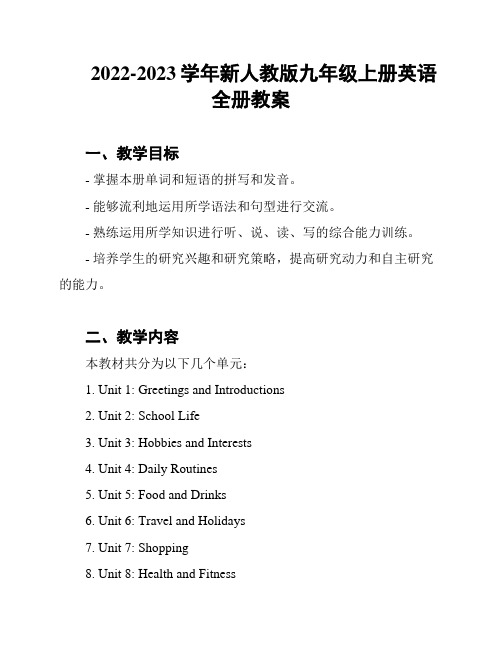
2022-2023学年新人教版九年级上册英语全册教案一、教学目标- 掌握本册单词和短语的拼写和发音。
- 能够流利地运用所学语法和句型进行交流。
- 熟练运用所学知识进行听、说、读、写的综合能力训练。
- 培养学生的研究兴趣和研究策略,提高研究动力和自主研究的能力。
二、教学内容本教材共分为以下几个单元:1. Unit 1: Greetings and Introductions2. Unit 2: School Life3. Unit 3: Hobbies and Interests4. Unit 4: Daily Routines5. Unit 5: Food and Drinks6. Unit 6: Travel and Holidays7. Unit 7: Shopping8. Unit 8: Health and Fitness9. Unit 9: Entertainment and Media每个单元包含以下几个部分:- Vocabulary:研究新词汇和短语,并进行拼写和发音练。
- Grammar:研究新的语法知识和句型,并进行相关练。
- Listening:进行听力训练,培养听力理解能力。
- Speaking:进行口语训练,提高口语表达能力。
- Reading:进行阅读训练,培养阅读理解能力。
- Writing:进行写作训练,提高写作水平。
三、教学方法- 任务型教学:通过任务设置,激发学生的研究兴趣和动力。
- 合作研究:鼓励学生进行小组合作,互相交流和研究。
- 多媒体辅助教学:利用多媒体资源来增强学生的研究效果。
- 游戏化研究:通过游戏和竞赛的方式来提高学生的研究积极性。
四、教学评估- 日常作业:布置练题和作文,检查学生的研究情况。
- 课堂表现:观察学生的参与程度和表现,评估其研究态度和能力。
- 随堂测验:进行小测验,检验学生对所学内容的掌握情况。
- 期末考试:进行综合性的考核,评估学生的研究成果。
- 1、下载文档前请自行甄别文档内容的完整性,平台不提供额外的编辑、内容补充、找答案等附加服务。
- 2、"仅部分预览"的文档,不可在线预览部分如存在完整性等问题,可反馈申请退款(可完整预览的文档不适用该条件!)。
- 3、如文档侵犯您的权益,请联系客服反馈,我们会尽快为您处理(人工客服工作时间:9:00-18:30)。
新人教版九年级英语上册精品教案全册合集Unit 1How can we become good learners?本单元围绕学习的话题,讲述了学习的障碍及对应的解决方法,对学生的学习有重要意义。
Section A 内容上侧重英语学习的方法,学生要学习、训练相关的语言内容和技能。
学生要重点掌握并能熟练、正确地运用与学习主题相关的单词和各种表达学习方法的短语、功能及句型结构How do you study/learn…?I study/learn…by…How can I…?You can…by…;以及学会用“by+v.-ing形式”结构来表达方式方法。
Section B在Section A谈论英语学习的基础上,在话题上,从英语的学习困难及解决方案,拓展到优秀学习者的学习习惯;在语言上,巩固和丰富了与学习相关的话题词汇;在技能上,将听、说能力综合,突出阅读训练,由读促写;在策略上,引导学生关注优秀学生的学习方式,并借鉴运用;在情感上,鼓励学生面对困难,积极探索解决方案,不断改进学习方法,提高学习效率。
The First Period—Section A(1a-2d)Teaching Important Points【教学重点】Key words & phrases:textbook,conversation,aloud,pronunciation,sentence,patient;study for,ask the teacher for help,work with a group,be patientKey sentences:1.—How do you study for a test?—I study by working with a group.2.—Does anyone learn English by watching videos?—No.It's too hard to understand spoken English.3.—Have you ever studied with a group?—Yes,I have.I've learned a lot that way.Key structure:verb+by doingeg:I study by working with a group.Teaching Difficult Points【教学难点】★Practice the structure “verb+by doing” in listening and speaking.Teaching Aids【教学工具】A tape recorder,CAI or multimedia courseware.Teaching Steps【教学过程】★Step 1Leading in【新课导入】(Ⅰ)1.GreetingGreet the class and briefly talk with the students about their holidays.2.DiscussingDiscuss with the students,like this:T:What do you usually do when you study English?S1:I often read English books.T:(To class) Good.He studies English by reading English books.That's a good way.(Then to another student)Now,what do you usually do when you study English?S2:I…3.Practice with more students.★Step 1Leading in【新课导入】(Ⅱ)1.GreetingGreet the class and tell the students the goal of this unit.2.PreparationT:Today we are going to talk about how to study.How do you study English?Collect the students' answers and prepare the language items for this period.★Step 2Cooperative inquiry【合作探究】1.Finish the task in 1a①Work in groups.Add more ways of studying English.②Read these phrases in 1a.Tell them the usage of “by doing” phrases.③Help students to say out their ways of studying.2.Finish the task in 1b①Read the instructions.②Play the recording for the first time.Students only listen.③Play the recording a second time.Ask them to match the ways with the names.④Check the answers with the whole class.3.Finish the task in 1c①In groups,interview their partners about how they study for a test.②One from each group reports to the class.4.Finish the tasks in 2a-2b①Use PPT or pictures for the students to learn the new words.Read the questions in 2a.②Get the students to guess the answers in 2b.③Play the recording for the first time.Students listen and check the questions.④Play the recording again.Students listen and match the answers with the questions in 1a.⑤Check the answers with the whole class.5.Finish the task in 2c①Show the pictures of the conversations.②Students work in pairs.③Ask three pairs to say out their conversations to the class.Show the PPT to help.6.Finish the task in 2d①Talk about the picture and scan the conversation.②Ask the students to read aloud the conversation in 2d.Learn the new words and phrases.③Ask these questions:How does Jack feel at the very start?What makes him feel like this(nervous)?What's Jack's problem when he reads?And what does Annie suggest?What's Jack's problem with words?And what's Annie's advice?④Check the answers with individual students to see how well they understand.⑤Play the recording and get the students to follow the teacher in the recording.Then ask two pairs to act out the conversation.★Step 3Homework1.Do a survey:How do you study for an English test?2.Imagine that you are Jack and Annie.Make a conversation to talk about your English study.3.Translate the following sentences into English.(1)你是怎样学习英语的?我通过大量阅读来学习。
________________________________________________________________________(2)理解这个问题对我来说太难了。
________________________________________________________________________(3)我通过听磁带来练习发音。
________________________________________________________________________Board Design板书设计Unit 1How can we become good learners?Section A(1a-2d)1.—How do you study for a test?—I study by working with a group.by asking the teacher for help,by reading the textbook,by doing(v.+ing)…2.—Have you ever studied with a group?—Yes,I have.I've learned a lot that way.textbook,conversation,read aloud,pronunciation(pronounce),sentence,patientword by word,a little nervousTeaching Reflection【教学反思】This is the first period of the unit.So it is important to get the students to know what they will learn in this unit.At the beginning the teacher should teach the main structure “by+doing”,and get the students to practice it in listening and speaking.Then we can come to reading practice.And new words and expressions are always main points in the first period of a unit.We'd better learn them while listening,speaking and reading.Do not separate them from the meaning group.The Second Period—Section A(3a-4c)Teaching Important Points【教学重点】Key words & phrases:expression,discover,secret,grammar,repeat,note,physics,chemistry;so…that/so that,because of,fall in love with,look up,take notesKey sentences:1.—How can I improve my pronunciation?—One way is by listening to tapes.2.—How can I read faster?—You can read faster by reading word groups.3.I usually practice my English by taking notes.4.It's a piece of cake.5.It serves you right.Key structure:verb+by doingeg:Do you learn English by doing grammar exercises?Teaching Difficult Points【教学难点】★Practice the structure “verb+by doing” in reading comprehension.Teaching Aids【教学工具】A tape recorder,CAI or multimedia courseware.Teaching Steps【教学过程】★Step 1Leading in【新课导入】(Ⅰ)1.Greeting2.BrainstormingQuickly ask questions about their English studying,using “by doing”.3.Ask pairs of students to act out the conversation in 2d.★Step 1Leading in【新课导入】(Ⅱ)1.Greeting2.Revision①Write the structure “by+doing” on the board and get the students to say some sentences about their English learning,using the structure.②Role-play the conversation in 2d.★Step 2Cooperative inquiry【合作探究】1.Finish the task in 3a①Help the students to understand the demand in 3a and read the three questions.②Quickly read the passage about Wei Fen and answer the three questions.③Check and discuss the answers to the questions.2.Finish the task in 3b①Read the instructions.②Read aloud the passage.③Get the students to work by themselves and complete the sentences with what Wei Fen learn from watching TV.④Check the answers with the whole class.3.Finish Grammar Focus①Read aloud the sentences in the grammar frame until fluently.②Find out the preposition phrases “by…”.③Remind that we use “by doing…” to talk about how we study or learn.Practice some sentences.4.Finish the task in 4a①Use PPT to show the six questions.②Get the students to add more ways of learning English.5.Finish the task in 4b① Read the instructions and the sample sentence in 4b.Then ask a student to make a new sentence as an example.②Students work in groups.③Ask one student from each group to say out the sentences to the class.6.Finish the task in 4c①Check what the students do to learn English.②Interview their partners.③Write a report to tell what they do to learn English and report to the class.★Step 3Homework1.Interview more students about how they learn English after class.2.Write a report about “Do we study English by doing the same thing?”3.Translate the following sentences into English.(1)我通过看英文电影来训练听力和口语。
